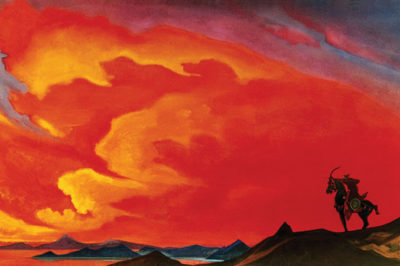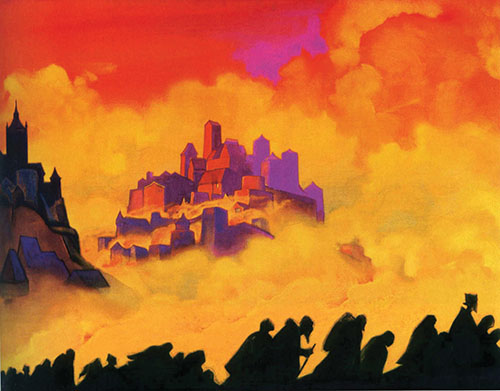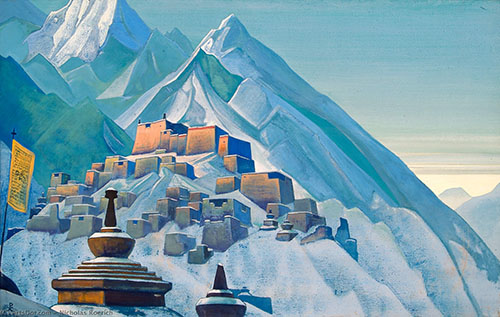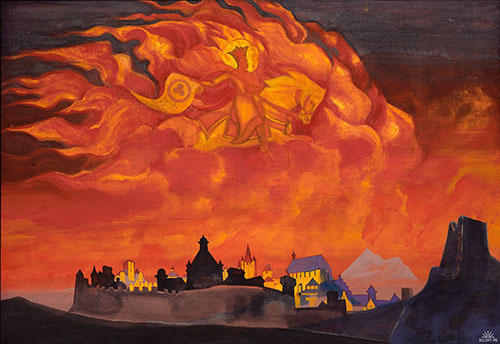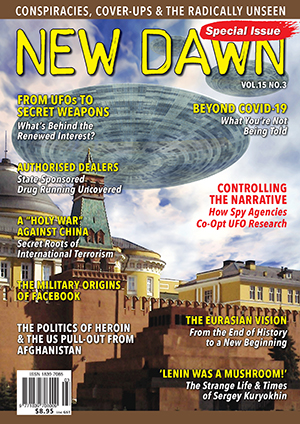From New Dawn Special Issue Vol 15 No 3 (June 2021)
The Eurasian idea is an open idea. It is open toward both the past and the future – what will happen in the future depends on how we understand and interpret the past. This is a very urgent problem, for we are by all means witnessing the collapse of the current international order, an order which was not really international but rather defined by the order of “one sovereign and one master.” In practice, this was a liberal order, defined by very specific visions and ideas into whose circles we inadvertently moved. Now we are finally free from this. We can take a breath of fresh air with full lungs and start “from scratch.”
Of course, this does not really mean starting from nothing. In the 1920s, the foundations for the Eurasian vision were laid by the persistent, quiet, patient work of enthusiasts (such as Petr Savitsky) and, even before, in the works of Danilevsky, Leontiev, and Dostoyevsky. These thinkers outlined a “Copernican revolution of history”: the future is not predetermined, and time does not run linearly. There are no privileged points on the globe, nor is there one privileged time, unless we adopt the axioms of liberal ideology. There is no singular and binding direction of historical development; rather, there are many divergent directions that cannot be compared to one another in terms of stages in the development of a single process.
Taken together, Danilevsky believed that these directions make up the richness of history and express the different possibilities of mankind’s development. In fact, every civilisation has its own time, and it draws its own schemata over the course of its development. Only the totality of civilisational paths gives the unique tracing that is the “development of humanity.” The new beginning for world order based on this recognition would correspond to the “other beginning” of which the philosopher Martin Heidegger spoke.
Liberal ideology has hitherto prescribed what “progress” is: it is always in the same direction, the only direction allowed. Behind this ideology has stood one world power: the United States of America. There is fundamentally only one world – that is the teaching they preached, a teaching which emerged out of the Enlightenment and quickly spread across the planet.
But, if the world is not a universe, then it is, in fact, a pluriverse: there are many worlds. Many of them have been hidden under the illusion of one world: opposite the First World during the Cold War stood the Second (Communist) World, and behind this, somewhere in the shadows, was the Third World (the non-aligned world which is today called the “Global South”).
This reality was not all-encompassing: the illusion of “convergence” revealed the reality of many worlds which were, in fact, many different civilisations – the American, the European, the Russian, Islamic, Indian, Chinese, etc. This is the truth that the West failed to grasp. Nor does it understand this today. The West was intoxicated by its victory in the Cold War in 1991, which was supposed to be followed by the “end of history” of which Francis Fukuyama spoke. That was what the West wanted to hear at the moment… And it seemed that all of humanity was obeying its will.
Yet, this obedience was only seemingly voluntary. It was backed by the world’s strongest power with its aircraft carriers capable of projecting its military might at “any point on the planet.” Then came the regime changes (of “undesirables” making up the “axis of evil”): colour revolutions, more or less violent coups, open military interventions, the occupation of entire countries… This is what the proclaimed “freedom” boiled down to. This was, however, only the “unipolar moment” in the history of the world. It is finished now.
The End of Western Hegemony
What’s happened with the hitherto hegemon? The hegemon is “tired” and is no longer capable of dictating to the whole of humanity. At first glance, it seems that all of this has been done by one tiny virus: the coronavirus. This, of course, is not the case. The virus was preceded by a prolonged fatigue, a crisis that has progressed within the West itself since at least the 1970s.
First, there was the “retreat of the West” (which is not a civilisation, but rather an ideological construct based on several basic Enlightenment ideas currently holding a certain number of countries together), and today its collapse is underway. The virus only made this crisis visible, and it will not be solved by any monetary measures, nor by ever-new military interventions as the globalists are now demanding.
Many are not yet aware of this major change. What about them? That is not our problem. What is important is grasping that the fundamental paradigms for the world of the future are being shaped today – or rather, it would be more appropriate to say, for the worlds of the future, because in such a world there will obviously be no single binding model that would be true for everyone.
“Western universalism” was only an illusion. Perhaps it was sweet and appealing to a few countries in which these ideas originated, but it was still only that: an illusion. Living in illusions is ill-advised. The awakening had to come sooner or later. But if it comes too much later, this awakening will be bitter. Today, people are waking up from the “American dream” to discover that it was a well-promoted nightmare and that they can live quite well without it.
At the same time, this poses a challenge to Eurasia which, after a brief absence, is finally returning to the historical scene. How can this transition be made as painless and with as few victims as possible? In other words, how can it be made known to the hitherto hegemon that it is no longer the hegemon (the one determining the future of all of humanity)? This is no easy task.
Today, of course, the hegemon is threatening and rattling its weapons. It is gathering forces for what appears to be a “final showdown” for the “final battle of history.” Will this decisive battle take place at all? It has nothing new to offer. It is only a more militant, slightly upgraded version of the same, with tolerance or its illusion abolished. In its upgraded edition, liberalism is becoming openly totalitarian (having hitherto been so covertly: “If you don’t want to be a liberal, you will be excluded from history” is now “Everyone must be a liberal”).
Rise of Eurasia
Meanwhile, new concepts and ideas have taken shape in Eurasia and are quickly being transformed into reality. One of these important projects is the “New Silk Road.” It is, in fact, a very old project that is now being revived, dressed in the new spirit of our times, a project to which the hegemon offers nothing other than interference (the same with the Nord Stream 2 gas pipeline). The hegemon wants quarrels, conflicts, and wars between peoples to thereby impose its dominance. This is how it ruled before. The Russian thinker Aleksandr Dugin has recently spoken of the need to “internationalise peoples” to oppose this hegemony, i.e., nations must not lose sight of the larger whole. They have to look at the much broader picture. This is a fundamental geopolitical reality which we cannot afford to forget.
The other reality is that of Eurasia itself. First and foremost, an alliance between China and Russia has taken shape. Integration in different forms is taking effect across the Eurasian continent – integration from which America is to be expelled. The Eurasian Economic Union is the initial form of such, its first incarnation, so to speak. The term “first in history,” however, should be used only with caution because it was preceded by the Soviet Union, before that by the Russian Empire, and still earlier by the empire of Genghis Khan. After all, every real historical project has its reflection in the distant past. The hope remains that for now, this “empire” still in outline develops in the direction of a fully-fledged Eurasian Empire.
This process could encourage others on other continents. We could imagine, for example, a Brazilian Empire, sovereign and independent, around which a circle of South American countries would gradually take shape. We could think of African empires or an Islamic caliphate (a true, not a fake one). And we could, in the distant future, imagine a North American Empire, one which would not claim universality for itself and which would express the North American people’s characteristic way of self-understanding, their internal Logos. Every empire, in fact, offers its own answer to the question of what the human being is. The North American people have not yet found a way to understand themselves (there is simply no “American dream”) and have thrown themselves into slavery to false elites in the service of “globalism.”
Future of Humanity an Open Project
Either way, the future of humanity is now an open project. Its future actors are defining their places. This is why it is imperative to move away from what the Russian philosopher Aleksandr Dugin calls the “Western codification of consciousness,” which is the custom of looking at the world through Western eyes. The Western cultural, political, social, and economic models are exhausted or have become a burden – an unnecessary, harmful, even dangerous burden. It is important to reassess these models or (if necessary) to abandon them altogether, once and for all, as soon as possible. The Western models for a “mandatory future” should be opposed by our own models of a possible and desirable future.
First and foremost, the concept of the nation-state and nationalist state has been overcome. As Rodrigo Sobota remarked, “we cannot forget the fact that the crystallisation of the nation-state as an artificial notion of the specifically Western character has deeply divided us.” The modern nation, reared within the homogenous nation-state and inspired by narrow and exclusive ethnonationalism, is not the same as the people, the community reared by long-standing history and culture, nor is the nation-state the only possible state. Along with the concept of the nation-state, “we must necessarily admit that the ancient Hegelian myth of the state, crystallised as he saw it in the venerable Imperial Germany, is in terminal decline.”
In today’s globalised world, nation-states, the undoubted product of the 19th century, as well as their firmly fixed borders, are disappearing, and new, supranational, continental or even global entities are being created. These are not merely processes of inevitable “dissolution,” but also processes of creating something new – opportunities for building new relations and ties between peoples. These processes are usually ambiguous in history: it is difficult to determine what is actually collapsing and what is being built. Not everything goes as planned. Processes can be reversed in one direction or another. In the new conditions, both colonialism and anti-colonialism are taking on new forms. Those ideas and concepts, which over the past three or more centuries gave impetus to the “modern West” and enabled its planetary supremacy in a brief historical period, are now exhausted.
This is most clearly visible today in the West itself: individualism, liberalism, and utilitarianism no longer ensure superiority – not even material – but are instead turning into obstacles and hindrances. Moreover, they are the reason for the internal collapse and rapid disintegration of Western society and its entire civilisation. All of them belong to the age of the Enlightenment as the fruits of the reason of “enlightened man,” “his majesty the Western European thinker.” It is vain to continue fruitless debates about “values” which are already dead and belong to the irreversible past. Is there a more obvious sign of “internal decay” than this?
Death of the Old, Birth of the New
We need to build new political, civilisational, and economic structures of continental proportions. We think that empires would be the most suitable for this. When we say “empire,” we have in mind the broadest possible meaning, entities sufficiently elastic and robust (at the same time) to protect their civilisational space from “outside intrusion.” This does not mean that existing nations will disintegrate or disappear within them. On the contrary, by being within them, they will acquire the conditions for normal development.
As for where this development will lead them, let the question remain open. “Human” in the plural is “the people,” and every people has its own unique face and character. Every people ought to continue their own particular development, with their own language, tradition, history, culture, and the special heritage which makes them precious and different from others. Empires arise out of the pursuit of this freedom. But this is not “freedom from,” but “freedom for”: freedom for everyone to be who they are.
Today, let us repeat, we live in an age of the agony and death of one civilisation – the Western one. This is a time of crisis, an interregnum, of which the great Italian philosopher Antonio Gramsci said: “Crisis consists precisely in the fact that the old is dying and the new cannot be born; in this interregnum a great variety of morbid symptoms appear.” The agonal cramps of one civilisation allow us to sense the contours of the future world. The “new” often comes into the world with birth pangs. There is no way for the sounds and voices of this to be silenced, no matter how hard they try to do so in the West.
The death of a civilisation, as a rule, means the birth of a new civilisation, or civilisations, which are in part created over its corpse (in this case, the dead body of the “West”). The new states and new arrangements are not completely “new,” just as “old” civilisations never die completely and entirely. Something will be taken over or inherited and given a whole new meaning and significance in a completely different context, while other things will be condemned to oblivion. The paradigms of new civilisations are built on old foundations. Both the Soviet Union and America, for instance, mysteriously resurrected the concept of empire and thus shaped the bipolar world of the past century.
Cultivating All Unique Cultures
In the first place, this applies to the sphere of culture. Culture is no longer and can no longer be dictated from one centre. We must free culture, or rather cultures, from everything that is outlived, boring, and stereotypical and return cultures to their original meaning. Culture and art are not planetary entertainment for bedtime; culture and art are revelations, awakenings, something that disquiets and moves us to search further for the “new.” Instead of one planetary and commercialised culture, pleasure for the masses, an intoxicating narcotic that always bears the same stamp (“made in the USA”), we will have cultures in the plural. “Yes” to Chinese, Russian, Korean, Greek, French, Finnish, Serbian, and many other cultures – as well as true American culture, a culture that has its own deep roots. “No” to the culture of stereotypes that boils down to faceless imitations, tediously and always repeating the same dilapidated, banal, and now wholly outdated clichés. We must return culture to its original meaning by creating it (anew). And this is, perhaps, our foremost task at the moment.
Today we are concentrating our thoughts on the future, on the “new beginning,” while looking back on the past. This is natural and logical. It cannot be otherwise, for everything new “is only a new expression of an ancient, eternal desire,” just as any true “other beginning” is not a mere return to or imitation of the past, but a “new beginning, more primordial than the previous.”
Boris Nad’s book The Reawakening of Myth is available to purchase from PRAV Publishing (www.pravpublishing.com) and online booksellers. With thanks to Jafe Arnold for the translation.
© New Dawn Magazine and the respective author.
For our reproduction notice, click here.

